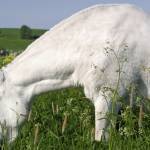Common Diseases of Older Horses

In general, horses are living longer than they commonly did a few decades ago, possibly because of better nutrition and less strenuous workloads. Though there is no specific definition of an older horse, any equine 20 or more years of age is generally thought of as an older animal. Ponies tend to live somewhat longer than horses, so they are overrepresented in the aged equine set. Maladies of the digestive, musculoskeletal, respiratory, and endocrine systems are the problems seen most often in older horses and ponies.
Digestive system Colic heads the list of digestive problems for the senior horse. Digestive and absorptive processes are decreased in older horses, and this is reflected in a greater percentage of large colon impactions as compared to younger horses. Older horses that require exploratory colic surgery are more likely than younger horses to have small intestinal strangulation from lipomas (fatty tumors with a long stalk that has become wrapped around the intestine). Choke is somewhat more frequent, possibly related to the senior horse’s decreased ability to chew feed and hay thoroughly. In other species, deficiencies in the mucosal tissue lead to a higher incidence of gastrointestinal ulceration. This may also occur in the horse, so anti-ulcer medication should be considered for older horses even though they may not show specific signs of ulcers. When assessing older horses for colic, it should be remembered that they are somewhat more tolerant of pain than their younger counterparts.
Weight loss is common in senior horses, and these animals tend to lose weight faster and regain it more slowly after illness. Even in the absence of disease, weight loss may be due to less efficient utilization of feed, ineffective organ function, and loss of chewing ability. Other factors may also play a role in weight loss, such as low status in the herd and therefore reduced access to hay and grain if horses are fed as a group.
Musculoskeletal system Lameness is a common complaint and is most often related to arthritis or laminitis. Pain from arthritis can often be managed so that the horses can continue to work or perform. Use of pain medications should be combined with longer warm-up and cool-down periods, less strenuous but more frequent exercise periods, and attention to the horse’s subtle signs of discomfort such as being less willing to work. Managed in this way, exercise can benefit the overall health of the horse.
Laminitis presents a larger problem because it is sometimes difficult to determine the exact cause and stage of the disease. Management of laminitis can be complicated and is not always effective.
Respiratory system Heaves, or recurrent airway obstruction, is often seen in older horses. This problem is caused by a reaction to dust, molds, and other airborne particles present in barns and stalls. A cough, exercise intolerance, and nasal discharge are common signs of this non-infectious inflammatory disease of the lower respiratory tract. Removing the horse from the barn is the best treatment, though signs may not disappear right away. If this is not possible, treatment with bronchodilators and anti-inflammatory medication is helpful. In either case, if significant improvement is not seen in 7 to 14 days, the horse should be reevaluated for other causes of irritation or infection.
Endocrine system Pituitary pars intermedia dysfunction (PPID), also knows as Cushing’s disease, is quite common in horses in their late teens and twenties. Growth of a heavy coat that fails to shed in spring is the most obvious sign, and 90% of horses with this type of coat have PPID. Laminitis, frequent drinking and urination, and lethargy are other frequently observed signs. Weight loss, persistent infections, and infertility may be present. Treatment involves good general health care, aggressive treatment of infections, and the avoidance of feeds high in carbohydrates. Pergolide, a dopamine agonist, is the drug of choice. PPID can’t be cured, but often it can be controlled with management changes and medication. Older horses with this chronic condition can often lead a useful and comfortable life for a number of years after diagnosis.








